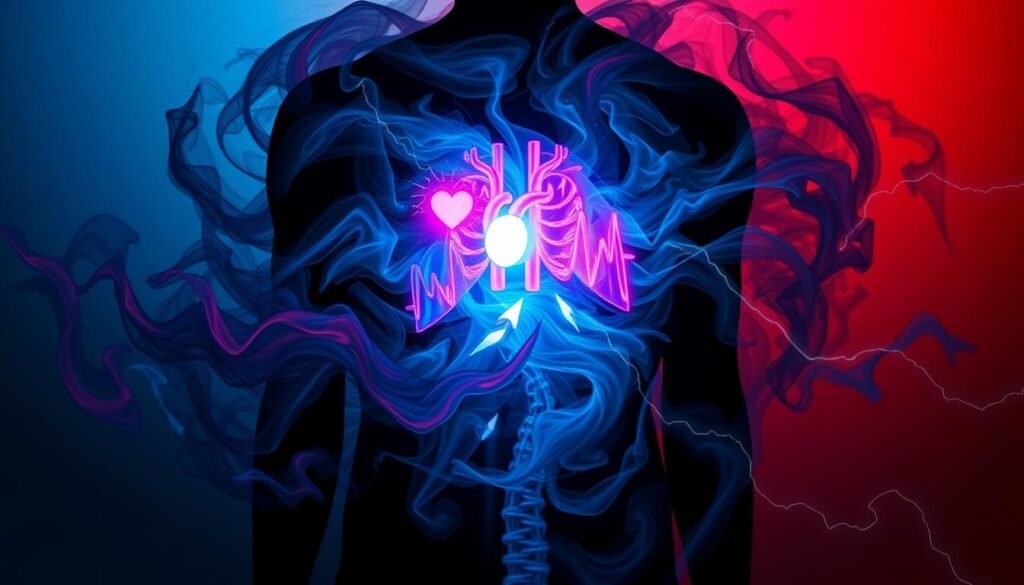About 30% of adults will face anxiety at some point. Anxiety is not just a mental issue; it affects us physically too. Chest pain is one common physical symptom. Many wonder if stress and anxiety are behind it. It’s key to know how stress and anxiety can cause chest pain. This helps tell it apart from heart issues.
Anxiety shows up not just in our thoughts but also in our bodies. People often feel sharp chest pains or tightness. Many in emergency rooms with chest pains actually have anxiety. Recognizing and treating these signs can help manage anxiety’s physical side.
We’ll dive into why anxiety causes chest pain, what happens in our bodies, and how to cope. Knowing when to seek help is crucial. For more, see these studies on anxiety and chest pain here. Learn more about anxiety conditions here.
Key Takeaways
- 30% of adults will experience an anxiety disorder in their lifetime.
- Anxiety disorders are the most common diagnosable mental health conditions.
- About 58% of individuals visiting the emergency room with chest pain report moderate to severe anxiety.
- Recognizing the difference between anxiety chest pain and heart-related issues is crucial for effective treatment.
- Deep breathing techniques can alleviate anxiety chest pains and normalize heart rates.
Understanding Anxiety and Stress
Anxiety is a natural response to stress. It acts as an alert to keep us safe in tough situations. But, when anxiety symptoms become overwhelming, it leads to anxiety disorders. It is vital to know the difference between normal anxiety and when it’s too much.
What is Anxiety?
Anxiety includes feelings like fear and worry. It triggers the body’s “fight or flight” mode, increasing heart rate and blood pressure. This can cause stress chest pain, similar to heart problems. People with anxiety disorders often experience severe fear and distress.
How Stress Affects the Body
Stress makes the body release certain hormones. These are meant for short-term challenges. Yet, lasting stress may cause serious issues, like psychosomatic chest pain. Symptoms like chest pain, breathing problems, and tension add to our stress. To lessen these effects, try exercising regularly, practicing mindfulness, and relaxing. For more info, here’s a detailed overview about anxiety and chest pain.
Can Stress and Anxiety Cause Chest Pain?
Stress and anxiety can indeed cause chest pain. Many people feel this due to the body’s reaction to stress. This is known as the fight-or-flight response. It triggers changes in the body that lead to chest pain.
One common feeling is a tight chest due to anxiety. This tightness can feel similar to serious heart issues. People might also have muscle tension, a fast heartbeat, and sweat. This makes it hard to know why they are in pain.
Chest pain from anxiety often comes from hyperventilating during stress. Bloating can also play a role. Too often, we don’t see how our mental health affects our body physically. Up to 25% of adults in the U.S. have had chest pain that isn’t from the heart. A lot of these cases are due to stress or anxiety.
Many times, doctors visits for chest pain don’t find a heart issue. This shows how important it is to understand how stress affects our bodies.
To tell the difference between chest pain from anxiety and the heart, look at the pain’s location and how it feels. Knowing this is key to handling the symptoms. You can control anxiety chest pain by focusing on breathing, changing your thoughts, and being in a calm place. These strategies help people manage their pain and know when to get medical help.
Symptoms of Anxiety Chest Pain
Anxiety can make your chest feel tight in different ways. This can lead to worry. People might feel different types of chest pain. Knowing these signs can help tell anxiety apart from serious conditions.
Types of Chest Pain Related to Anxiety
Chest pain from anxiety usually comes on suddenly and feels sharp. People describe it in many ways, such as:
- Sharp, stabbing pain
- Dull aches that linger
- Muscle spasms
- Periods of chest tightness
- A burning sensation
These symptoms can happen even when you’re not moving, and they might last about ten minutes. Up to 40% of folks in emergency rooms for chest pain that’s not serious have it because of anxiety. Learning about chest pain symptoms related to anxiety can help you deal with them better.
How Anxiety Feels Differently for Each Individual
Everyone feels anxiety in their own way. Some might have anxious heart palpitations. Others might have different signs related to their feelings. People find their own ways to cope. This affects how they see anxiety-related chest pain.
It’s important to get checked by a doctor if you have these symptoms. This ensures you don’t have a serious condition. It also helps you get the right plan to manage your anxiety.
Understanding the Mind-Body Connection
The link between our minds and bodies deeply affects our health. It’s particularly true with stress and anxiety. Understanding this connection helps us see why emotional upset can cause physical issues, such as chest pain.
How Emotional Distress Triggers Physical Symptoms
Emotional distress causes our bodies to react in specific ways. Stress hormones like cortisol and adrenaline rush in. They get us ready for a fight-or-flight response. This often shows up as physical symptoms.
Tension in the muscles and mind-body connection chest discomfort are common. These problems can mess with our heart rhythms and make our heart rates shoot up. It shows how deeply our emotions affect our bodies.
The Role of the Autonomic Nervous System
The autonomic nervous system is key in handling stress. It controls things we don’t think about, like heart rate and breathing. Stress can make this system overreact.
That overreaction may cause problems. You might breathe faster or feel more anxious. Sometimes, it can cause Broken Heart Syndrome. This syndrome looks a lot like a heart attack. It brings on significant emotional distress physical symptoms, including chest pain, because of emotional stress.
| Physical Symptoms | Possible Causes |
|---|---|
| Chest Pain | Stress, anxiety, Broken Heart Syndrome |
| Shortness of Breath | Overstimulation of the autonomic nervous system |
| Increased Heart Rate | Release of adrenaline during stress |
| Muscle Tension | Chronic stress and emotional distress |
Identifying Anxiety Chest Pain vs. Heart Attack
Knowing the difference between anxiety chest pain and a heart attack is key for safety. It helps people know how to act in a dangerous situation. Anxiety chest pain usually feels sharp and is in one spot, often with a fast heartbeat or heavy breathing.
On the other hand, heart attack symptoms can spread to the arm, back, or jaw. It often feels like pressure or a tight squeeze in the chest. These signs come up with physical work or stress and last longer than anxiety’s brief discomfort. Even though panic attack symptoms can look like a heart attack, they aren’t as strong or long-lasting.
| Symptoms | Anxiety Chest Pain | Heart Attack |
|---|---|---|
| Chest Pain Type | Sharp or shooting | Pressure or squeezing |
| Duration | Minutes, typically resolves quickly | Persistent; may change in intensity |
| Triggers | Emotional stress | Physical exertion |
| Associated Symptoms | Rapid heartbeat, shortness of breath | Nausea, jaw or arm pain, sweating |
| Demographics | More common in individuals with anxiety disorders | Women may experience atypical symptoms such as back or jaw pain |
Panic attack symptoms, including chest pain, aren’t deadly but they can really affect your mental health. If you’re worried, especially if it’s your first time feeling this, get medical help. This makes sure you get the right diagnosis and treatment for anxiety or a heart attack. It brings peace of mind and safety.
What Causes Anxiety Chest Pain?
Anxiety can show up in physical ways, and chest pain is a big worry for many. It’s important to know why this happens to better manage it. When you’re anxious, your heart beats faster, and your muscles tense up. This can make your chest feel uncomfortable.
Physiological Responses during Anxiety
When you feel anxious, your body reacts in several ways. The fight-or-flight system kicks in, powered by adrenaline. This makes your:
- Elevated heart rate
- Increased blood pressure
- Heightened muscle tension
These changes can lead to chest pain from muscle spasms and nervous tension. People often say it feels like a heavy weight is on them. This can make you feel trapped or panicked.
Muscle Tension and Spasms
Muscle tension is common during anxiety. This can cause spasms in the chest, making the pain worse. Things like past trauma, ongoing stress, and worry about health can cause this tension.
- Traumatic experiences and their recurrent triggers
- Chronic stress and anxiety
- Fear of impending health issues
Sharp pains can suddenly appear, making you alarmed. Feeling faint and having heart palpitations are also common. These signs help tell anxiety chest pain apart from other serious conditions. Knowing what anxiety chest pain feels like helps manage fear about it.

| Symptoms | Anxiety Chest Pain | Heart Attack |
|---|---|---|
| Onset | Sudden | Gradual |
| Nature of Pain | Stabbing, sharp | Heavy pressure or squeezing |
| Associated Symptoms | Faintness, trembling, palpitations | Nausea, shortness of breath |
| Physical Activity Trigger | No | Yes |
Understanding these causes better helps people manage their symptoms. They can learn to calm themselves or seek help when needed. It’s about taking steps to feel better and handle anxiety more effectively.
Panic Attacks and Chest Pain Symptoms
Panic attacks can make you feel intense things, like really bad chest pain. These feelings usually come from fear and body reactions. They can happen just a few times a year or many times a week. If they happen a lot, it might mean someone has panic disorder. This needs careful attention and management.
When you have a panic attack, it might feel like your chest hurts because your heart is beating too fast. The pain can be sharp and last a little while. Sometimes, it might feel like it’s not going away. This can be confusing, especially for women. It might feel like a heart attack. Women are more likely to get panic disorders than men, about twice as likely.
Knowing about these chest pains from panic attacks can help calm you down. It helps to breathe slowly and remind yourself that it will pass. Things like keeping your blood sugar steady, cutting down on caffeine and alcohol, exercising, and sleeping well can also help prevent panic attacks.
Some good ways to manage panic attacks include cognitive behavioral therapy, mindfulness, and exposure treatment. Doctors might also suggest medicines to help you feel better. Understanding panic attacks and how they relate to chest pains is really important. It helps people deal with their experiences better.
Home Remedies for Anxiety-Induced Chest Pain
There are many ways to manage chest pain caused by anxiety at home. You can try deep breathing, be mindful, or change what you eat to feel better. These methods are great for easing anxiety and stress.
Deep Breathing Techniques
Deep breathing is about taking slow breaths to calm your nerves. It makes you focus on breathing and relax. Try to inhale for four counts, hold it, and then exhale for six counts. Doing this often can help control your anxiety and chest pain.
Mindfulness and Relaxation Strategies
Being mindful means living in the now, which can lower your stress. Try activities like meditation or yoga. Doing such activities often is good for your mind and body. It helps if you have chest pain from anxiety. It also helps you handle stress better over time.

Pairing mindfulness with deep breathing is a strong way to tackle chest pain from anxiety. This combo is becoming more important as we learn how stress affects our bodies. Making these practices part of your daily life can make you healthier and more balanced.
| Remedy | Benefits | Suggestions for Use |
|---|---|---|
| Deep Breathing Techniques | Calms the nervous system and reduces anxiety | Daily practice for 5-10 minutes |
| Mindfulness Meditation | Enhances focus and present-moment awareness | Integrate into morning or evening routines |
| Yoga | Combines movement with relaxation | Try classes or online tutorials regularly |
| Dietary Adjustments | Supports overall well-being and reduces inflammation | Incorporate foods like almonds and turmeric |
Seeking Professional Help
Anxiety-induced chest pain can feel scary and confusing. It often seems like other serious health issues. Knowing when to get help for anxiety is key for effective treatment. It helps you find peace. Learning the signs that need medical advice can help diagnose and manage anxiety and chest pain.
When to Consult a Doctor
One should see a doctor if chest pain continues or gets worse. Anxiety chest pain can feel sharp or dull. You might also have a faster heart rate or sweat a lot. If chest pain lasts more than 10 minutes or spreads to arms, neck, or back, get medical help right away. It’s important because getting help for anxiety helps tell panic attacks from serious issues like heart attacks.
Treatment Options for Anxiety and Chest Pain
There are many ways to treat anxiety and chest pain. Healthcare experts can create plans just for you. These plans may include:
| Treatment Options | Description |
|---|---|
| Therapy | Cognitive-behavioral therapy (CBT) helps change negative thoughts. It reduces anxiety symptoms. |
| Medication | Anti-anxiety meds and antidepressants can help some people feel better. |
| Lifestyle Changes | Adding regular exercise, eating healthy, and getting enough sleep can improve anxiety and ease chest tightness. |
| Breathing Techniques | Deep breathing exercises can help control anxiety effectively. |
| Mindfulness Practices | Mindfulness and meditation lower stress and boost emotional health. |
If you’re dealing with anxiety, talk to health experts about these options. Working with doctors on anxiety help and making lifestyle changes can greatly improve life quality.
Understanding Anxiety Disorders
Anxiety disorders are conditions that cause too much fear or worry, affecting daily life. People can have anxiety disorder chest pains. They may also have many other symptoms besides physical discomfort.
Common Types of Anxiety Disorders
There are several common types of anxiety disorders:
- Generalized Anxiety Disorder (GAD): This is when people worry too much about different areas of life.
- Panic Disorder: It causes sudden panic attacks and extreme fear, making someone feel in danger.
- Social Anxiety Disorder: This makes individuals very anxious in social settings, avoiding interactions.
- Specific Phobia: A fear caused by certain objects or situations, leading to avoidance.
Symptoms Beyond Chest Pain
Besides chest pains, anxiety sufferers may face other issues:
- Feeling restless or being unable to calm down.
- Stomach problems, like nausea or diarrhea.
- Problems with sleep, such as insomnia or trouble staying asleep.
- More muscle tension, causing headaches or soreness.

Conclusion
Stress and anxiety can lead to physical symptoms, including chest pain. It’s important to know this link is well-documented. Many people who feel anxious also experience chest pain. Studies show 15% of people getting medical checks have severe anxiety.
This means stress and anxiety can indeed cause chest pain. It’s vital for patients and doctors to think about mental health during check-ups. Not many with severe anxiety get the help they need; only about 27.3% use anti-anxiety meds. Also, people with lots of anxiety often smoke more. We need to look after our mental and physical health together.
It’s key to understand how our minds and bodies are connected. Managing anxiety can involve deep breathing, staying active, and therapy. Tackling these issues in every way is essential. This approach helps people feel better overall.